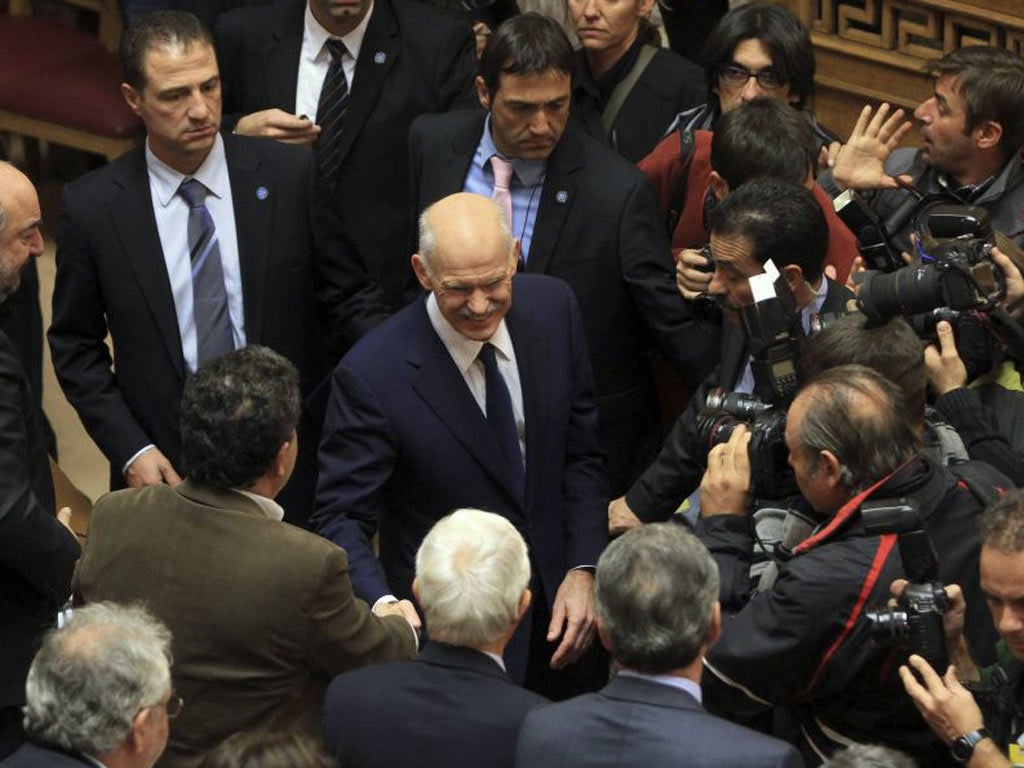Papandreou: Last desperate gamble backfires for the quiet leader with politics in his blood

Your support helps us to tell the story
From reproductive rights to climate change to Big Tech, The Independent is on the ground when the story is developing. Whether it's investigating the financials of Elon Musk's pro-Trump PAC or producing our latest documentary, 'The A Word', which shines a light on the American women fighting for reproductive rights, we know how important it is to parse out the facts from the messaging.
At such a critical moment in US history, we need reporters on the ground. Your donation allows us to keep sending journalists to speak to both sides of the story.
The Independent is trusted by Americans across the entire political spectrum. And unlike many other quality news outlets, we choose not to lock Americans out of our reporting and analysis with paywalls. We believe quality journalism should be available to everyone, paid for by those who can afford it.
Your support makes all the difference.When it was time for the last throw of the dice, it came without the support of the Socialist Party machine his father had built, and without the foreign leaders he had courted so assiduously.
Wearied by the bitter reception he received on his return home from the EU summit, George Papandreou gambled everything on an appeal over the heads of self-interested parliamentarians, directly to the people, to endorse the rescue deal he had delivered and to restore his political legitimacy.
The rioters, plotters and opposition, the unemployed and angry clients of a bankrupt state would have to choose between the euro and austerity or the wilderness of default. It was the only question left that the Greek Prime Minister could ask to which the answer would not be a resounding "No".
Only a single ministerial ally and the political minder that the Papandreou dynasty had drafted in to look after him early in his career knew what was coming on Monday. No one else could be trusted. The ambitious finance minister, Evangelos Venizelos, who was a student protégé of Andreas Papandreou before he became the son's most aggressive rival for the party leadership, had no inkling that the dice had been thrown. Upon learning, he checked himself into hospital complaining of improbable stomach pains – a tactic that reminded some of Greece's disgraced Olympian Costas Kenteris, who in 2004 holed himself up in an Athens clinic on the eve of a drugs test.
EU leaders who had grown accustomed to the mild-mannered charm of Greece's leader were overcome with fury and speaking of betrayal. They say Greece cannot get bailout cash until it agrees the deal.
In his chaotic final days in office, even as he refused to resign last night, the confusion between how the US-educated 59-year-old premier was seen at home and his reception abroad reached new heights. Once the shock had passed, EU leaders were prepared to back his unilateral plan to put Greece's bailout to a referendum despite the rancorously unpredictable nature of Greek public opinion. Even though Papandreou aides admitted to a "horrible day" in Cannes on Tuesday as their man was pilloried by his European counterparts, the line held. By yesterday morning foreign analysts were queuing up to praise the democratic credentials of the "quiet man" at the eye of the storm and wondering whether the gamble might pay off.
In Athens, something quite different was going on. The son and grandson of prime ministers was being castigated in the press and elsewhere as the "lord of chaos". Being summoned to Cannes was nothing to what was waiting at home. By yesterday afternoon, as the scale of the rebellion within the ranks of the ruling socialists became clear, he was forced into a humiliating climbdown over the referendum in a bid to survive until a confidence vote that had been scheduled for today.
Should his exit be confirmed, his supporters will want him remembered for finally exposing the scale of Greece's debt crisis even though he was unable to tackle it. They will also point to the détente achieved with historic adversary Turkey, during an impressive five years as foreign minister, in the teeth of nationalist sentiment at home.
His critics will remember him as another dynastic failure – a leader who inherited his father's populist movement and gave it a social democratic makeover without really getting to grips with the cronyism that infected it. For months it has appeared that Mr Papandreou had more political capital in Brussels than he did in Athens. But by the end of yesterday it was all spent anyway.
Join our commenting forum
Join thought-provoking conversations, follow other Independent readers and see their replies
Comments